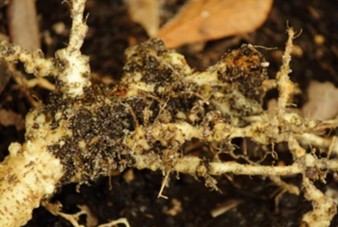Root-knot nematode (Meloidogyne spp.) disease is one of the important pathogenic organisms that harm crops. It is widely distributed worldwide with a wide range of hosts, especially in tropical and subtropical areas. Tobacco root-knot nematodes are plant parasitic nematodes which mainly feed on plant roots, causing tumors in plant roots, making nutrient absorption difficult, and even decay, thus affecting crop yield. More than 80 species of root-knot nematodes have been reported. It was first reported in 1892 and has occurred in the United States and other places since 1950. At present, it has been reported in major smoke-producing areas around the world.
Lifeasible is a credible provider of high-quality functional analysis services for tobacco root knot nematode diseases in plants. Our platform has state-of-the-art facilities and highly experienced staff to support projects in all areas. We guarantee to deliver results on time to our customers.
 Fig.1 Root knot nematode.
Fig.1 Root knot nematode.
Lifeasible provides fast turnaround, high quality services at competitive prices for customers worldwide. Our advanced technical platforms can help our clients complete the research process with quality and quantity. If you are interested in our services or have any questions, please feel free to contact us or make an online inquiry.
Lifeasible has established a one-stop service platform for plants. In addition to obtaining customized solutions for plant genetic engineering, customers can also conduct follow-up analysis and research on plants through our analysis platform. The analytical services we provide include but are not limited to the following:
Get Latest Lifeasible News and Updates Directly to Your Inbox
Adaptive Evolutionary Mechanism of Plants
February 28, 2025
Unraveling Cotton Development: Insights from Multi-Omics Studies
February 27, 2025